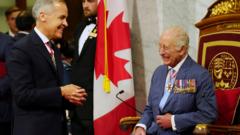In a historic address to the Canadian Parliament, King Charles III was greeted with a standing ovation, a testament to the goodwill surrounding his appearance. The speech, delivered at the invitation of the new Prime Minister Mark Carney, championed the notion of Canada as "strong and free," though it notably skirted the contentious topic of US President Donald Trump.
While the King expressed a commitment to "protect Canadians and their sovereign rights," he refrained from naming specific figures that might challenge this independence, including Trump, whose past remarks about Canada potentially becoming the 51st state loomed over the gathering.
The message of democracy, pluralism, and the safeguarding of individual freedoms resonated throughout the address, yet Trump’s influence was palpable in its absence. Worldly acknowledgment was made toward the need to limit the flow of fentanyl across borders, echoing recent accusations against U.S. officials, yet the President remained unmentioned.
Following weeks of heightened anti-Trump sentiment leading up to the general elections, Prime Minister Carney spoke of Canada's resilient sovereignty and the efficacy of the royal attendance, asserting the importance of the monarchy in preserving Canadian pride against its more powerful neighbor.
The day was marked not only by political significance but also cultural representation as First Nations communities adorned in traditional regalia highlighted the importance of indigenous heritage within Canada’s national identity. With the speech translated in both French and English, King Charles underscored the nation’s diversity.
The setting was emblematic as the Senate convened in a temporary location, the former Ottawa railway station, a site enriched with history, reflecting the fabric of Canadian society.
Attendees savored the moment; selfies were snapped amidst a palpable air of excitement. The nonchalant nature of the proceedings contrasted with more formal occasions elsewhere, with even former PM Justin Trudeau sporting casual green sneakers.
As King Charles concluded his speech, crowds outside shared their appreciation, expressing their relief at his supportive visit. A public anointing of this royal visit illustrated a yearning for solidarity as Canada navigates its relationship with the U.S.
Responding to the speech, a U.S. State Department spokesperson praised the royal family, though some may speculate whether sentiments could have broader implications.
Ultimately, King Charles III's visit served a dual purpose: to reinforce Canada’s independence while subtly acknowledging the complexities of international relations underscored by the absence of specific political figures.
The event captured the essence of a nation longing for recognition and esteem on the global stage, highlighting the role of tradition and monarchy in reinforcing national identity in tumultuous times.
While the King expressed a commitment to "protect Canadians and their sovereign rights," he refrained from naming specific figures that might challenge this independence, including Trump, whose past remarks about Canada potentially becoming the 51st state loomed over the gathering.
The message of democracy, pluralism, and the safeguarding of individual freedoms resonated throughout the address, yet Trump’s influence was palpable in its absence. Worldly acknowledgment was made toward the need to limit the flow of fentanyl across borders, echoing recent accusations against U.S. officials, yet the President remained unmentioned.
Following weeks of heightened anti-Trump sentiment leading up to the general elections, Prime Minister Carney spoke of Canada's resilient sovereignty and the efficacy of the royal attendance, asserting the importance of the monarchy in preserving Canadian pride against its more powerful neighbor.
The day was marked not only by political significance but also cultural representation as First Nations communities adorned in traditional regalia highlighted the importance of indigenous heritage within Canada’s national identity. With the speech translated in both French and English, King Charles underscored the nation’s diversity.
The setting was emblematic as the Senate convened in a temporary location, the former Ottawa railway station, a site enriched with history, reflecting the fabric of Canadian society.
Attendees savored the moment; selfies were snapped amidst a palpable air of excitement. The nonchalant nature of the proceedings contrasted with more formal occasions elsewhere, with even former PM Justin Trudeau sporting casual green sneakers.
As King Charles concluded his speech, crowds outside shared their appreciation, expressing their relief at his supportive visit. A public anointing of this royal visit illustrated a yearning for solidarity as Canada navigates its relationship with the U.S.
Responding to the speech, a U.S. State Department spokesperson praised the royal family, though some may speculate whether sentiments could have broader implications.
Ultimately, King Charles III's visit served a dual purpose: to reinforce Canada’s independence while subtly acknowledging the complexities of international relations underscored by the absence of specific political figures.
The event captured the essence of a nation longing for recognition and esteem on the global stage, highlighting the role of tradition and monarchy in reinforcing national identity in tumultuous times.






















